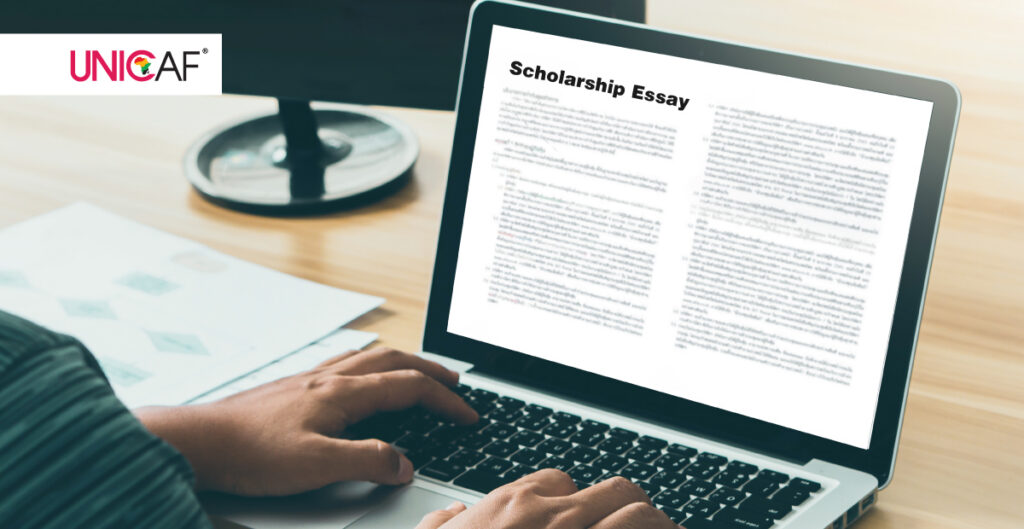Securing a scholarship often comes down to more than just grades or test scores—your essay can be the deciding factor. A well-crafted scholarship essay allows you to share your personal story, highlight your achievements, and explain your goals in a way that resonates with the selection committee.
In this guide, we explore what scholarship essays are, why they matter, and the types you may encounter, including personal statements, career goals essays, financial need essays, and “Why do you deserve this scholarship?” essays.
You’ll learn how to approach prompts, structure your essay, choose the right tone, and avoid common pitfalls. We also cover practical tips for writing, reviewing, and submitting your essay, as well as examples of successful essays to inspire you.
Whether you’re applying for a general scholarship or a specialised award like a CFA scholarship, this post provides actionable advice to help you write a compelling, authentic essay that stands out and increases your chances of success.
What is a scholarship essay?
A scholarship essay is a personal statement written as part of a scholarship application, intended to show who the applicant is beyond academic results and test scores, while also highlighting why they merit financial support for their education. Through the essay, you have the chance to share your personal story, achievements, goals, and motivations in a way that convinces the scholarship committee why you deserve financial support.
Unlike a standard academic essay, a scholarship essay is more personal and reflective. It should give insight into your character, values, and aspirations, while also showing how the scholarship will help you achieve your academic and career goals. In simple terms, it’s your opportunity to stand out and make a strong case for yourself.
How important is the essay in the scholarship selection process?
The essay plays an important role in the scholarship selection process, often holding considerable influence on how applicants are assessed and compared. For many scholarships, essay responses can constitute 65–75% of the overall score a candidate receives during evaluation. This means a well-crafted essay can significantly boost the chances of being selected, even among students with similar academic backgrounds.
Through your essay, the selection committee gets a glimpse of your personality, ambitions, and unique story. It allows them to understand your motivation, resilience, and potential contribution to society—qualities that numbers on a transcript cannot capture.
In many cases, a well-written essay can tip the balance in your favour, even if your academic record is not the strongest. It demonstrates your ability to communicate clearly, think critically, and reflect on your experiences. Ultimately, the essay is often the deciding factor in who receives the scholarship and who does not.
What is a CFA scholarship essay?
A CFA scholarship essay is a written statement required when applying for the CFA Institute’s scholarship programmes, such as the Access Scholarship. The essay gives applicants the opportunity to explain their interest in pursuing the Chartered Financial Analyst (CFA) designation, their career goals, and why they need financial assistance to cover the exam fees.
Unlike general scholarship essays, a CFA scholarship essay is more focused on professional aspirations and commitment to the investment and finance industry. It should demonstrate your passion for the CFA programme, your dedication to professional growth, and how earning the CFA charter will help you contribute to the field.
In short, the CFA scholarship essay is your chance to show the CFA Institute why you are a motivated, deserving candidate who will make the most of the opportunity.
What is the main purpose of a scholarship essay?
The main purpose of a scholarship essay is to give applicants the opportunity to present themselves as more than just grades and qualifications. It’s a way to showcase personal values, life experiences, ambitions, and the reasons why financial support will make a difference in their academic or professional journey.
A strong scholarship essay helps the committee understand who you are, what drives you, and how their investment in you will have a lasting impact. It connects your story with the mission of the scholarship provider, showing alignment between your goals and their values.
The outcome of a well-written essay is twofold: it increases your chances of winning the scholarship, and it allows you to reflect on your own path, helping you better articulate your purpose and direction for the future.
How does a scholarship essay help applicants stand out?
A scholarship essay gives applicants a competitive advantage by highlighting their individuality in ways that grades and certificates cannot. Since many candidates may have similar academic achievements, the essay becomes the space where personality, values, and vision shine through.
It allows you to share unique experiences, challenges you’ve overcome, and the personal motivations driving your goals. This emotional connection can make your application more memorable to the committee.
Beyond storytelling, the essay also demonstrates important skills such as critical thinking, clarity in communication, and the ability to reflect on personal growth—qualities scholarship providers value highly.
In essence, the essay is where applicants move from being just another name on paper to becoming a real, relatable person worth investing in.
Why do scholarship applications require essays?
Scholarship applications require essays to help selection committees learn about the applicant’s individual qualities, motivations, and future goals that are not reflected in grades or test scores.
Essays reveal how well applicants align with the mission of the scholarship provider and how they intend to use the financial support to pursue meaningful academic or career aspirations.
Scholarship applications often include essay prompts for several key reasons:
- To understand the applicant’s personality – Essays reveal character traits, values, and passions that grades alone cannot show.
- To assess motivation and goals – Committees want to see why you are pursuing your chosen path and how the scholarship will help you achieve it.
- To evaluate communication skills – Clear, well-structured writing demonstrates your ability to express ideas effectively.
- To identify unique experiences – Personal stories, challenges, and accomplishments help distinguish you from other candidates.
- To ensure alignment with scholarship objectives – Essays show whether your goals and values align with the mission of the scholarship provider.
- To predict potential impact – Committees look for applicants who are likely to succeed academically, professionally, and in contributing to their communities.
Essays are more than a formality—they give selection committees the insight they need to make informed decisions.
Who reads and evaluates scholarship essays?
Scholarship essays are usually reviewed by a selection committee appointed by the scholarship provider. This committee can include scholarship administrators who manage the application process and ensure all submissions meet the basic requirements, academic professionals who assess the applicant’s potential for success in their chosen field of study, and sometimes industry experts who evaluate essays for relevance, ambition, and alignment with professional standards.
Additionally, committee members representing the organisation often review essays to ensure applicants reflect the scholarship’s mission and values. The committee evaluates each essay based on clarity, originality, alignment with the scholarship’s goals, and evidence of motivation and commitment. Their main aim is to identify applicants who are not only academically capable but also genuinely deserving and likely to make the most of the opportunity.
What are the types of scholarship essays?
Scholarship essays come in different forms, each with a specific focus. Understanding the type of essay you are writing helps you tailor your response and make a stronger impact. The main types include:
Personal Statement Essays – These essays focus on your personal story, experiences, and character. They allow you to share who you are, what challenges you’ve overcome, and the values that shape your ambitions. Personal statement essays give the committee a sense of your personality and individuality.
Career and Academic Goals Essays – These essays require you to outline your academic and professional aspirations. You explain your short-term and long-term goals, how the scholarship will help you achieve them, and how your education aligns with your chosen career path.
Financial Need Essays – These essays emphasise your financial situation and why you require support. You provide context about your circumstances, explain the obstacles you face in funding your education, and demonstrate how the scholarship will make a meaningful difference.
“Why Do You Deserve This Scholarship?” Essays – These essays are designed for you to make a compelling case for why you are the ideal candidate. You highlight your achievements, qualities, commitment, and potential contributions, showing the committee that awarding you the scholarship is a worthwhile investment.
Each type of essay serves a unique purpose, but all aim to present a clear, authentic, and persuasive picture of the applicant.
What prompts are commonly used for scholarship essays?
Scholarship essay prompts are designed to help applicants express their goals, experiences, and personal qualities.
While the exact wording may vary, typical themes include:
- Personal Background and Experiences – Questions about your life story, challenges you’ve overcome, or significant experiences that shaped who you are.
- Academic and Career Goals – Prompts asking about your short-term and long-term goals, your chosen field of study, and how the scholarship will support your aspirations.
- Financial Need – Questions that require you to explain your financial situation and why you need support to pursue your education.
- Achievements and Contributions – Prompts focused on your accomplishments, leadership roles, volunteer work, or ways you’ve positively impacted your community.
- Motivation and Passion – Questions that explore why you are passionate about your field of study or a particular cause, and how you plan to make a difference.
- Why You Deserve the Scholarship – Prompts that ask you to make a compelling case for being chosen, highlighting your strengths, dedication, and alignment with the scholarship’s mission.
These prompts help scholarship committees assess not just your qualifications, but also your character, potential, and fit for the award.

What is the structure of a scholarship essay?
The structure of a scholarship essay includes an introduction, body paragraphs, and a conclusion, all organised to present a compelling personal narrative that answers the scholarship prompt and highlights achievements, motivations, and goals.
A well-organised scholarship essay usually follows a clear and logical structure:
- Introduction – Start with a hook that captures attention and briefly introduces who you are and what the essay will cover.
- Body Paragraphs – Develop your main points with supporting details, such as personal experiences, achievements, goals, and challenges overcome.
- Connection to the Scholarship – Explain how the scholarship will help you achieve your academic or career objectives and why you are a suitable candidate.
- Conclusion – Summarise your key points, reinforce your motivation and suitability, and leave a lasting impression on the reader.
Following this structure ensures your essay is clear, compelling, and easy for the selection committee to follow.
How long should a scholarship essay be?
The ideal length of a scholarship essay varies depending on the specific scholarship’s requirements, but most essays fall between 500 and 1,000 words. Shorter essays, around 250–500 words, may be acceptable for simpler prompts or quick-answer questions, while more detailed essays can go up to 1,000 words.
It’s important to follow any word or page limits provided by the scholarship provider. Writing too little may make your essay seem underdeveloped, while writing too much can overwhelm the reader. The key is to be concise, focused, and compelling, ensuring every word adds value to your story and strengthens your application.
How to write a scholarship essay?
To write a strong scholarship essay, follow a clear process: understand the prompt, plan with an outline, use personal stories, structure the essay professionally, and revise until you have a concise, compelling narrative that fits the requirements.
Step-by-Step Guide
1. Understand the Prompt – Carefully read the essay question or prompt to fully understand what the scholarship committee is asking. Identify the key themes and requirements.
2. Brainstorm Ideas – Reflect on your experiences, achievements, goals, and challenges. Make a list of stories or examples that best illustrate your strengths and align with the prompt.
3. Create an Outline – Organise your ideas into a logical structure with an introduction, body paragraphs, and conclusion. Decide which points you want to highlight and the order in which they should appear.
4. Write a Strong Introduction – Begin with a hook that grabs attention and introduces the main theme of your essay. Clearly state who you are and what the essay will cover.
5. Develop the Body Paragraphs – Use the body to expand on your ideas with specific examples, achievements, and experiences. Explain how these relate to your goals and why they make you a strong candidate.
6. Connect to the Scholarship – Clearly explain how receiving the scholarship will help you achieve your academic, professional, or personal goals. Show the committee why you are a deserving candidate.
7. Write a Memorable Conclusion – Summarise your key points, reinforce your motivation, and leave a lasting impression. End on a confident and positive note.
8. Revise and Edit – Review your essay for clarity, grammar, and spelling. Ensure your ideas flow smoothly and that your personality and passion shine through. Consider asking a teacher, mentor, or friend to provide feedback.
Following these stages will help you craft a well-structured, persuasive, and authentic scholarship essay that stands out.
When should you start your scholarship essay?
It’s best to start your scholarship essay well in advance of the deadline, ideally several weeks before submissions are due. Starting early gives you enough time to brainstorm, draft, revise, and polish your essay without feeling rushed.
Beginning early also allows you to reflect deeply on your experiences and goals, ensuring your essay is thoughtful and authentic. Last-minute writing often results in vague or hurried content, which can weaken your chances.
By starting early, you can also seek feedback from teachers, mentors, or peers and make meaningful improvements, increasing the likelihood of creating a compelling, standout essay.
What tone is appropriate for a scholarship essay?
The tone of a scholarship essay should be professional, sincere, and confident. It’s important to convey your personality and passion while maintaining respect and clarity in your writing.
Avoid being overly casual or using slang, but don’t make the essay sound stiff or impersonal either. The best essays strike a balance between authentic storytelling and polished communication, allowing the reader to connect with you on a personal level.
At the same time, your tone should reflect positivity and motivation, showing the committee that you are driven, responsible, and ready to make the most of the opportunity. Honesty, humility, and enthusiasm are key elements that create a strong and relatable essay.

What are the most frequent mistakes made in scholarship essays?
Even strong applicants can lose points by making common mistakes in their scholarship essays.
Some of the most frequent pitfalls include:
- Failing to answer the prompt – Writing an essay that doesn’t directly address the question can make the committee question your focus and understanding.
- Being too generic – Using vague statements or clichés instead of sharing personal experiences makes your essay blend in with others.
- Poor organization – Essays that lack a clear structure or flow can confuse readers and weaken your message.
- Overemphasizing achievements without reflection – Listing accomplishments without explaining their significance or how they shaped you can make the essay feel shallow.
- Ignoring word limits – Writing too little may underdevelop your points, while writing too much can overwhelm the reader.
- Grammatical and spelling errors – Mistakes in language can distract the reader and make the essay seem careless.
- Lacking a personal voice – Failing to show your personality or unique perspective reduces your ability to stand out.
Avoiding these mistakes ensures your essay is clear, engaging, and persuasive, giving you a better chance of winning the scholarship.
Who should review your essay before submission?
Before submitting your scholarship essay, it’s important to have others review it to catch mistakes and provide feedback. Teachers, mentors, or academic advisors can offer valuable guidance on clarity, structure, and content.
Peers, friends, or family members can also provide fresh perspectives, helping you identify areas that may be confusing or less compelling. Choosing reviewers who understand the scholarship’s purpose or have experience with similar applications is especially helpful.
Having your essay reviewed ensures it is polished, coherent, and impactful, increasing your chances of making a strong impression on the selection committee.
How are essays graded or scored?
Scholarship essays are evaluated based on a combination of factors that help the selection committee determine the applicant’s suitability. While each scholarship may have its own scoring system, common criteria include:
- Relevance to the Prompt – How well the essay addresses the question or theme set by the scholarship.
- Clarity and Organization – The essay should be well-structured, with a clear introduction, body, and conclusion, and ideas should flow logically.
- Content and Depth – Essays are scored on the strength of the ideas, experiences, and insights shared, as well as how effectively the applicant connects them to their goals.
- Originality and Personality – Essays that reflect the applicant’s unique voice, perspective, and creativity tend to stand out.
- Grammar and Writing Quality – Correct grammar, spelling, punctuation, and polished language contribute to a professional impression.
- Alignment with Scholarship Goals – Committees assess whether the applicant’s values, aspirations, and potential impact align with the mission of the scholarship.
Each essay is typically reviewed by one or more committee members, who assign scores or provide qualitative evaluations based on these criteria. The combined assessment helps the committee decide which applicants are most deserving of the award.
What are some examples of successful scholarship essays?
While full scholarship essays are often confidential, we can highlight the qualities and approaches of winning essays to help you understand what makes them stand out. Successful essays often include:
1. Personal Storytelling – A student shared how growing up in a single-parent household inspired resilience and ambition. They explained challenges they overcame, lessons learned, and how the scholarship would allow them to pursue higher education in engineering.
2. Clear Career Goals – Another applicant outlined their long-term goal of becoming a healthcare professional. They described volunteer experiences, academic achievements, and how the scholarship would directly support their plan to contribute to underserved communities.
3. Strong Connection to the Scholarship – One winning essay emphasised alignment with the scholarship’s mission, detailing the applicant’s passion for environmental sustainability and their commitment to launching local conservation projects if awarded the funding.
4. Authentic Voice – Successful essays convey authenticity and sincerity. Instead of listing achievements, students explained the significance of each experience and reflected on personal growth, making their essays memorable to the committee.
These examples show that compelling scholarship essays combine personal stories, clear goals, genuine motivation, and alignment with the scholarship’s purpose. By highlighting your unique journey and aspirations, you can create an essay that captures attention and leaves a lasting impression.
How should you submit your scholarship essay?
Submitting your scholarship essay properly is just as important as writing it well. Following best practices ensures your application is professional, complete, and considered on time.
First, carefully review the scholarship guidelines for submission format, file type, and word limits. Some scholarships may require a typed document in PDF format, while others may allow or require pasting text directly into an online form. Always follow these instructions exactly.
Next, double-check your essay for spelling, grammar, and formatting errors. A polished, error-free essay demonstrates attention to detail and professionalism.
Include any required information, such as your name, scholarship ID, or page numbers, as specified by the application instructions.
Finally, submit your essay before the deadline, allowing some buffer time for technical issues or unexpected delays. Keep a copy of your final essay for your records in case it is needed for follow-up or verification.
By adhering to these submission best practices, you ensure that your essay reaches the committee in the best possible form and maximises your chances of success.
It is important to note that Unicaf does not require a scholarship essay in its application process.
Final Thoughts
Writing a winning scholarship essay takes time, reflection, and careful planning, but it is also a powerful opportunity to showcase your unique story and goals. To maximise your chances of success, start early, thoroughly understand the prompt, and organise your ideas into a clear, compelling structure.
Focus on authenticity—share personal experiences, lessons learned, and future aspirations with sincerity. Always connect your story to the scholarship’s purpose, demonstrating why you are a deserving candidate.
Revise carefully, seek feedback from mentors or peers, and ensure your essay is polished and error-free. Finally, submit your essay according to the scholarship’s guidelines and before the deadline.
By approaching your scholarship essay strategically and thoughtfully, you give yourself the best chance to stand out, make an impression, and secure the funding that can help you achieve your academic and career dreams.



